Luckily, the most effective and critical insurance policies to protect your Yamaha outboard are inexpensive. Of course, all recommended maintenance is important, but four critical maintenance essentials are Yamaha Ring Free Plus, Yamalube Fuel Stabilizer and Conditioner Plus, Yamalube engine oils, and Yamaha oil filters. This article focuses on Yamaha Ring Free Plus—do you really need it?
What is Yamaha Ring Free Plus designed to do?
This highly concentrated fuel additive has two critical jobs:
- Protect your outboard from carbon buildup
- Protect it from the effects of ethanol-gasoline and other gasoline containments.
Let’s examine these two issues one.
Prevents carbon buildup
Boat owners often compare their outboard engine operation with that of their car. Yes, both your outboard engine and your car’s engine are combustion engines with the same mechanical principles. However, the environment the two engines operate within are significantly different. For example, outboard engines frequently reach and maintain speeds between 3500 and 6000 RPM. However, your car reaches only about 2200 RPM when running on the highway.
Another big difference is that outboards have oil sumps and exhaust systems that are immersed in water when the boat is not on plane, resulting in much lower operating temperatures. Combine this with the large amounts of time that outboards spend at idle or trolling speeds, and it’s easy to see how carbon buildup in the combustion chamber occurs much faster in your outboard’s engine than in your car’s.
Carbon buildup in the combustion chamber is just bad.
- Piston rings stick in their grooves and cannot seal tightly
- Cylinder walls become glazed allowing exhaust blow-by and excessive crankcase pressure
- Gasket failure is the common result
When rings stick and cylinder walls glaze, unburned fuel gets past the rings and contaminates crankcase oil—this results in a condition known as “making oil” that is extremely detrimental to long engine life.
The concern: Carbon buildup in your outboard’s engine is quite harmful to your engine’s performance and longevity.
The good news: One ounce of Yamaha Ring Free Plus to every 10 gallons of gasoline solves the problem.
Ring Free Plus avoids the damage caused by gasoline contamination
Many marine experts recommend running ethanol-free gasoline in your outboard. This might be the best approach for you, but ethanol-free gasoline can be tougher to find and is generally more expensive. Much of the gas at the pumps today contains 10 percent ethanol.
The problem with ethanol gasoline in outboard engines boils down to basic chemistry. We spent a considerable amount of time discussing the article “Ethanol Gasoline in Outboard Engines.” If you are feeling scientific, we encourage you to check it out, but here are the basics. Ethanol prefers to bond with water rather than gasoline. Through many factors—the natural process of condensation, your boat operating in a water environment, and the accidental introduction of water into the fuel system—water finds its way into the fuel tank.
Water is heavier than gasoline. If both water and ethanol gas is in the fuel tank, water will sit on the bottom of the tank—your fuel pump is also at the bottom of the tank. This is a problem, but the problem is about to compound. If enough water is in the fuel tank, ethanol will leave the gasoline and bond with the water, which potentially doubles the volume of the water in your tank. You can end up with water enriched with ethanol rather than ethanol-enriched gasoline.
An additional source of contamination is debris from your gas station’s holding tanks. While you run the risk of “old gasoline” at a low-volume station (always try to frequent a high-volume station), even the popular stations’ tanks will age, increasing the odds of introducing unexpected contaminants to your outboard engine.
The concern: Using gasoline with ethanol increases the odds of phase separation, which can cause significant damage to your outboard. Even if you run ethanol-free fuel, there is always the risk of contaminants unknowingly being introduced to your fuel system.
The good news: One ounce of Yamaha Ring Free Plus to every 10 gallons of gasoline solves the problem.
Proper Yamaha maintenance requires genuine Yamaha outboard parts and Yamalube products – PartsVu is happy to help.


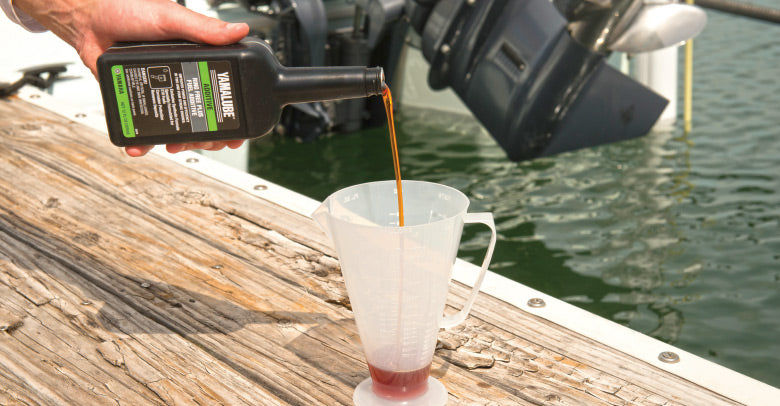
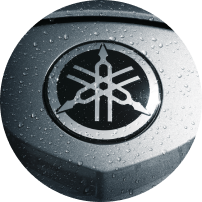
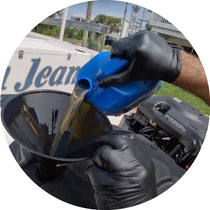
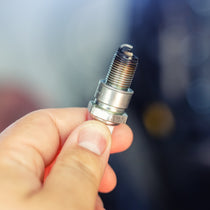
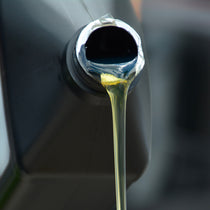
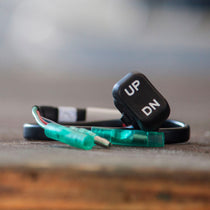
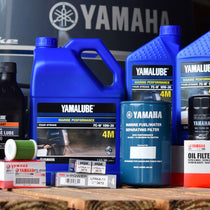
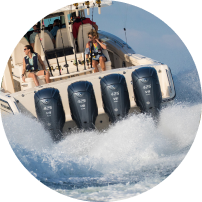

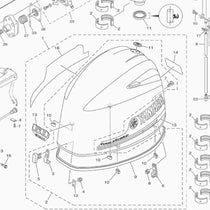











4 comments
My 200 Yama runs on Ethanol Free all the time, and I still juice it up with Ring Free. Every 100 hr. service, my marine mechanic pulls the spark plugs and just smiles and grins!!!
My engine is 9 years old, and runs in offshore saltwater every outing. There is enough to worry about with that issue……so using Ring Free in my fuel keeps me worry free.
Hal
The bottle has the amount per gallon. 1oz to 10 gallons
I accidentally added ring free plus 12oz to my 16 gallon tank, mistook the ring free for the stabilizer. Is this harmful to my engine?
Most people looking up this info just want to know the mix amount. You wrote paragraphs that could’ve answered the question in one sentence.